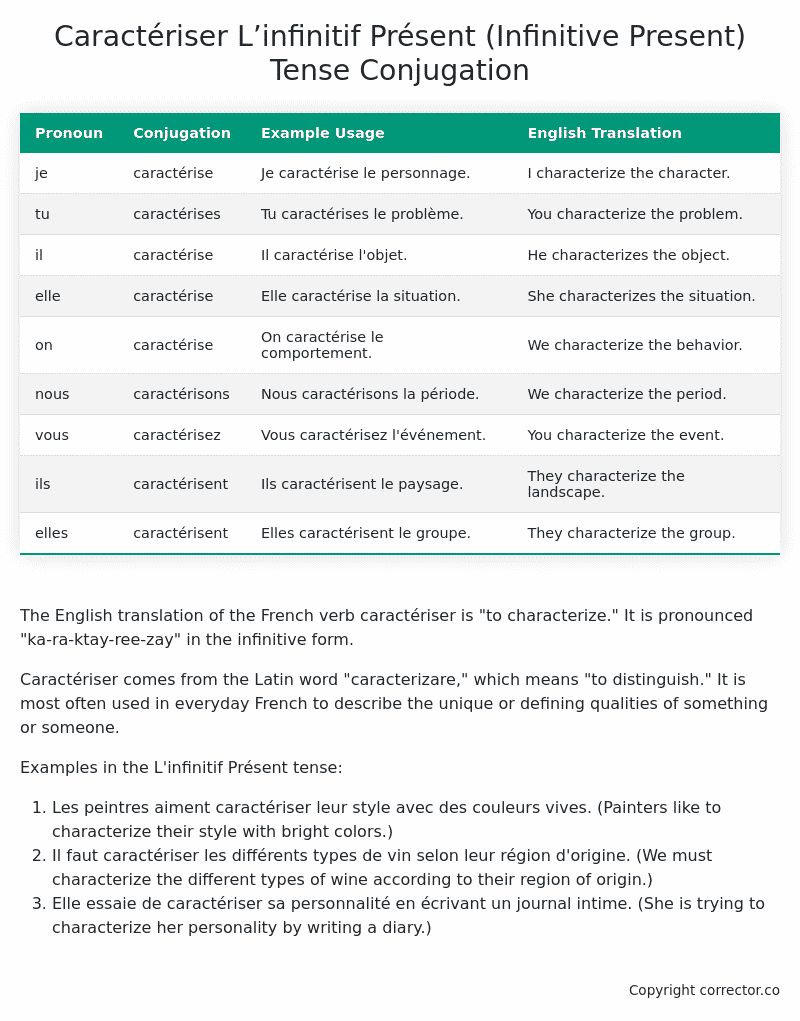L’infinitif Présent (Infinitive Present) Tense Conjugation of the French Verb caractériser
Introduction to the verb caractériser
The English translation of the French verb caractériser is “to characterize.” It is pronounced “ka-ra-ktay-ree-zay” in the infinitive form.
Caractériser comes from the Latin word “caracterizare,” which means “to distinguish.” It is most often used in everyday French to describe the unique or defining qualities of something or someone.
Examples in the L’infinitif Présent tense:
- Les peintres aiment caractériser leur style avec des couleurs vives. (Painters like to characterize their style with bright colors.)
- Il faut caractériser les différents types de vin selon leur région d’origine. (We must characterize the different types of wine according to their region of origin.)
- Elle essaie de caractériser sa personnalité en écrivant un journal intime. (She is trying to characterize her personality by writing a diary.)
Table of the L’infinitif Présent (Infinitive Present) Tense Conjugation of caractériser
| Pronoun | Conjugation | Example Usage | English Translation |
|---|---|---|---|
| je | caractérise | Je caractérise le personnage. | I characterize the character. |
| tu | caractérises | Tu caractérises le problème. | You characterize the problem. |
| il | caractérise | Il caractérise l’objet. | He characterizes the object. |
| elle | caractérise | Elle caractérise la situation. | She characterizes the situation. |
| on | caractérise | On caractérise le comportement. | We characterize the behavior. |
| nous | caractérisons | Nous caractérisons la période. | We characterize the period. |
| vous | caractérisez | Vous caractérisez l’événement. | You characterize the event. |
| ils | caractérisent | Ils caractérisent le paysage. | They characterize the landscape. |
| elles | caractérisent | Elles caractérisent le groupe. | They characterize the group. |
Other Conjugations for Caractériser.
Le Present (Present Tense) Conjugation of the French Verb caractériser
Imparfait (Imperfect) Tense Conjugation of the French Verb caractériser
Passé Simple (Simple Past) Tense Conjugation of the French Verb caractériser
Passé Composé (Present Perfect) Tense Conjugation of the French Verb caractériser
Futur Simple (Simple Future) Tense Conjugation of the French Verb caractériser
Futur Proche (Near Future) Tense Conjugation of the French Verb caractériser
Plus-que-parfait (Pluperfect) Tense Conjugation of the French Verb caractériser
Passé Antérieur (Past Anterior) Tense Conjugation of the French Verb caractériser
Futur Antérieur (Future Anterior) Tense Conjugation of the French Verb caractériser
Subjonctif Présent (Subjunctive Present) Tense Conjugation of the French Verb caractériser
Subjonctif Passé (Subjunctive Past) Tense Conjugation of the French Verb caractériser
Subjonctif Imparfait (Subjunctive Imperfect) Tense Conjugation of the French Verb caractériser
Conditionnel Présent (Conditional Present) Tense Conjugation of the French Verb caractériser
Conditionnel Passé (Conditional Past) Tense Conjugation of the French Verb caractériser
L’impératif Présent (Imperative Present) Tense Conjugation of the French Verb caractériser
L’infinitif Présent (Infinitive Present) Tense Conjugation of the French Verb caractériser (this article)
Struggling with French verbs or the language in general? Why not use our free French Grammar Checker – no registration required!
Get a FREE Download Study Sheet of this Conjugation 🔥
Simply right click the image below, click “save image” and get your free reference for the caractériser L’infinitif Présent tense conjugation!

Caractériser – About the French L’infinitif Présent (Infinitive Present) Tense
Forming the Infinitive Present
Common Everyday Usage Patterns
As a Verb’s Dictionary Form
After Modal Verbs
As an Imperative
In Infinitive Clauses
Interactions with Other Tenses
Present Tense
Future Tense
Conditional Tense
Passé Composé
Imperfect Tense
Subjunctive and Conditional Moods
Summary
Want More?
I hope you enjoyed this article on the verb caractériser. Still in a learning mood? Check out another TOTALLY random French verb conjugation!


